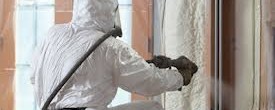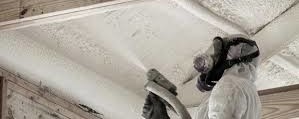We are a full service insulation contractor specializing in Spray Foam Insulation servicing St. John’s and surrounding areas.
Our services include:
-
Residential and Commercial Projects
-
New Builds and Renovations
-
Spray Foam Insulation
-
Fibreglass Insulation
-
Mineral Wool Insulation
-
Rigid Insulation
-
Blown-In Insulation
-
Vapour Barrier Installation
Please see our Quick Links for more information about our products and services.
An overview of Spray foam (SPF) insulation
History
Polyurethane, the most common type of spray foam insulation, was developed and used by the military in the 1940s and applied to airplanes. It wasn’t until the 1970s that it started to be used as foam insulation.
Various systems are used to apply the spray foam. The two component high pressure system is generally used in new home construction. It is a quick expanding type of spray foam. The two component low pressure spray foam is another system that is used primarily for remodel jobs where there are existing walls with drywall already in place. This is also known as a slow rise formula and often referred to as injection foam.
Types
Spray foam insulation can be categorized into two different types: open cell (also referred to as 1/2 lb) and closed cell (also referred to as 2 lb).
Open cell foam insulation
Open cell is a type of foam where the tiny cells are not completely closed. Open cell is less expensive because it uses fewer chemicals. It is a very good air barrier but does not provide any type of water vapor barrier. It is much more sponge-like in appearance. It is often used for interior walls because it provides sound reduction.
Closed cell foam insulation
Closed cell foam insulation is much denser than open cell. It has a smaller, more compact cell structure. It is a very good air barrier as well as a water vapor barrier. It is often used in roofing projects or other outdoor applications, but can be used anywhere in the home.
Benefits
Spray foam insulation saves on energy costs and lowers utility bills. Studies have shown that 40% of a home’s energy is lost as the result of air infiltration through walls, windows and doorways. Buildings treated with spray foam insulation typically insulate as much as 50% better than traditional insulation products.
Insulation that is sprayed in buildings protects against moisture, which provides the benefit of reducing the chance of harmful mold and mildew. Eliminating mold growth reduces the likelihood of rotting wood in a home, and allergic reactions to mold spores.
In addition to building temperature and moisture control, spray foam insulation is often used to reduce noise. Foam insulation serves as a barrier to airborne sounds, and reduces airborne sound transfer through a building’s roof, floor and walls.





